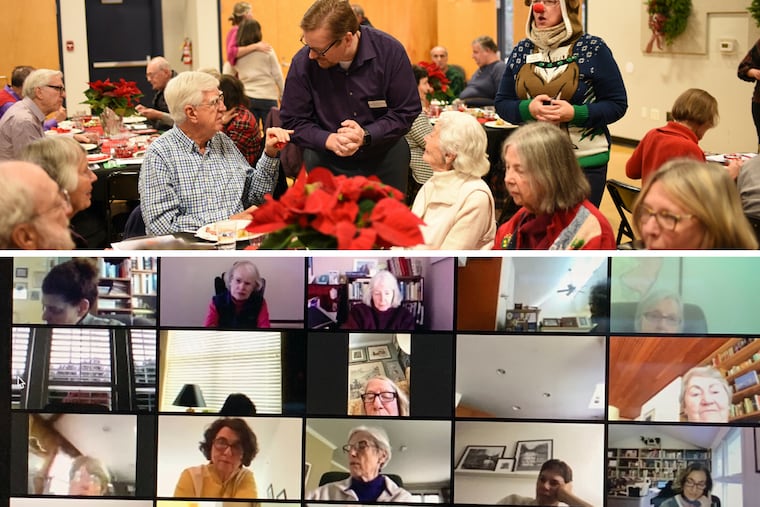Our hidden frontline workers need more support | Opinion
Statewide efforts to enforce social distancing will depend on the efforts of local nonprofits whose workers aren't getting enough attention.

It is genuinely moving to see the videos of people emerging, on their balconies, and applauding the stream of exhausted health workers exiting hospitals at the end of a shift. But as we celebrate those on the front lines treating patients on the brink of death, take a minute to consider the people on the other front line in this pandemic. This group spends their days in obscurity, but their role in this pandemic is just as important as the doctors keeping people alive. Their job is to make sure the people they serve never get to the hospital.
Over the past several weeks I have sat in on Zoom calls with leaders of local organizations providing basic social services in Mercer County, NJ, where I live. What I have seen has made me rethink the challenge of coronavirus and our response to it.
The first lesson? Statewide efforts to enforce social distancing will depend on the efforts of local nonprofit leaders. The people who run food pantries, shelters, senior centers, housing assistance programs, and health clinics are focusing on a dimension of this crisis barely discussed in national newscasts: How can we mitigate its impact on individual lives? How can we serve our neighbors while keeping them out of harm’s way?
Before the virus took hold, local nonprofit leaders in Mercer County anticipated what was coming and made plans to respond. The head of the Princeton Senior Resource Center organized meetings to coordinate services and make plans for a collective response. Arm in Arm, which provides a wide range of supports to people around Mercer County, began to think about how they could shift from in-person provision of food to delivery. The leaders at Meals on Wheels of Mercer County knew their service would become exponentially more important in the weeks ahead, and set up volunteer recruitment efforts, adding morning orientations to their daily schedule.
After listening to this group, I quickly realized my academic background and research weren’t helpful here. My job was to stand back and ask how I could help.
» READ MORE: The people too essential to isolate share how their lives have changed under coronavirus
If you want to see the other front line in the battle against this virus, spend a few hours volunteering your time — making sure, it should go without saying, that you are doing more good than harm amid social distancing. Venture outside only if you will be helping people who should not be outside themselves, and who will be vulnerable to the virus without your efforts. Do not go outside if you’re feeling any hint of sickness, and be exceedingly careful about washing hands, wearing gloves, and sanitizing surfaces if you do decide to volunteer.
On one of my shifts delivering meals I walked through an apartment building where almost every resident I saw was in the segment of the population most at risk of succumbing to COVID-19. Yet they lived in a building where the hallways were cramped, and only one tiny elevator worked. For many, staying inside wasn’t a realistic option; they need health services, prescriptions and groceries. The second lesson? Social distancing is crucial for the people in this building, but without an infrastructure of support it is completely unrealistic.
» READ MORE: PHL COVID-19 Fund earmarks more than $2 million in first round of grants to nonprofits
I took a moment to observe health workers in a clinic on the first floor of a home for older adults. They were risking their own health every day, yet they were the ones responsible for the care of hundreds of people most vulnerable to the virus. If they don’t show up for work, what happens next? The third lesson: the impact of this virus will be determined not only by our investments in health technology and medical equipment, but also by our investment in support of local service providers and care workers.
The workers on the other front line know what they’re doing, but they need help.
We can start by offering our time. Many of the regulars at organizations like Meals-on-Wheels tend to be older, retired adults. They should be home right now. This is a moment for young people, home from school and with less to do than usual, to step up and offer their time to help others around them.
» READ MORE: How to help, or get help, in Philly during coronavirus
For those of us lucky enough to be economically secure in this insecure time, it is a moment to give our resources to the organizations that are saving lives, well before any ventilators are needed. Find out local organizations who are helping people struggling during this crisis, or donate to an organization like GiveDirectly, which does exactly what their title implies and has focused their resources on helping people dealing with COVID-19.
And, lastly, it is time for our nation to make a commitment to the local organizations that provide the foundation for community life. The federal government has made a preliminary investment to mitigate the financial damage of this virus, to help people who are losing their jobs, and to keep businesses afloat. We need a similar commitment to make sure communities don’t fall apart.
Patrick Sharkey is Professor of Sociology and Public Affairs at Princeton University’s Woodrow Wilson School of Public and International Affairs. www.patricksharkey.net. @patrick_sharkey